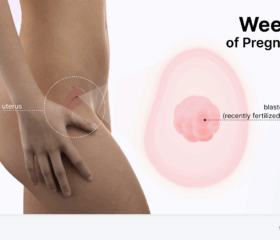How to Deal with Headaches During Pregnancy
Headaches often pop up as an unwelcome surprise during pregnancy. The good news is that there are many effective ways to manage them.

Although headaches usually aren’t serious, that doesn’t make them any less annoying. With so much on your plate already, the last thing you need is a throbbing pain in your head.
Learn what triggers headaches during pregnancy and what the best treatments and preventative measures are.
Are headaches an early sign of pregnancy?
Yes, headaches can be an early sign of pregnancy. They often result from your hormones rising rapidly in the first trimester. 1
As with most pregnancy symptoms, the intensity and frequency of headaches vary from person to person. Some pregnant women don’t experience headaches at all, whereas in others, they’re severe.
Don’t rely on headaches (or other possible pregnancy symptoms) alone to determine if you’re pregnant; the surest way to find out if you’re carrying is to take a pregnancy test.
What causes headaches during pregnancy?
As mentioned, rising hormone levels during early pregnancy may cause headaches. You may get a little relief during your second trimester, once your hormones stabilize.
Headaches during pregnancy can also be caused (or made worse) by: 2
- Dehydration: Since your body needs extra fluids during pregnancy, it’s easy to get dehydrated. Moreover, if you’re suffering from morning sickness (nausea and vomiting), that could make you more prone to dehydration. 3
- Caffeine withdrawal: Many pregnant women taper off of coffee and other caffeinated drinks. You might get headaches when you cut back or eliminate caffeine. To avoid this, try gradually weaning off of it rather than stopping abruptly. For instance, you could switch to less potent teas as a step-down approach.
- Low blood sugar: Drops in blood sugar can also cause headaches. Eat regularly and don’t skip meals.
- Stress and fatigue: It’s no secret that stress can make your head hurt, and pregnancy comes with many physical and emotional demands that can be overwhelming.
- Sinus congestion: Some pregnant women suffer from sinus congestion and, by extension, sinus headaches. 4
What’s more, if you’re prone to migraines, certain foods, including aged cheeses, chocolate, processed meats, and artificial sweeteners may trigger these. 5 6 That’s the case for all migraine sufferers, not just moms-to-be.
Common types of headaches during pregnancy
There are two categories of headaches that you may get during pregnancy:
Primary headaches
Primary headaches don’t have another underlying medical condition linked to them. Here are the main types of primary headaches during pregnancy: 7
- Migraines: This is the most common type of primary headache among pregnant women, accounting for 90% of all headaches, with about 30% of women suffering from it. 7 In addition to intense, throbbing pain, it may come with other symptoms, including nausea and sensitivity to light and sound. Some women experience visual disturbances, speech issues, or tingling in the hands and face, called “auras,” before having a migraine. 2
- Tension headaches: This type of headache can feel like having pressure or a tight band around your head. They often result from stress, depression, fatigue, caffeine withdrawal, and pregnancy hormone changes. 2
- Cluster headaches: A type of trigeminal autonomic cephalgia (TAC), cluster headaches are relatively rare in pregnant women. 7 They involve severe, stabbing pain around one of your eyes or temples, often accompanied by a watery eye or runny nose on the affected side. Note that cluster headaches are not the only kind of TAC, and some women also suffer from other, less well-known types.
Secondary headaches
Secondary headaches derive from another medical condition, such as pituitary tumors, stroke, and venous thromboembolism (when there are blood clots in your veins). 7
- Sinus headaches: Often mistaken for migraines, sinus headaches are caused by sinus congestion and infection. 8 You may feel pressure and pain in your face, especially around the eyes, cheeks, and forehead.
- Preeclampsia-related headaches: Persistent headaches, especially in the second or third trimester, can be a sign of preeclampsia, a serious pregnancy complication where you have high blood pressure and protein in your urine. Contact your doctor if you have other symptoms alongside your headaches, like vision changes, abdominal pain, breathing trouble, and swelling. 9
How do you treat headaches during pregnancy?
You can treat most pregnancy headaches without taking medication. Here are some common non-medical approaches to alleviating headaches:
- Rest in a dark, quiet room: Fluorescent lighting and windowless workspaces can trigger headaches. If you have to work, try dimming the lights and moving to a quiet space.
- Apply a cold or warm compress: Place a cold pack on your forehead, temples, or the back of your neck for about 15–20 minutes at a time. Alternatively, if you have tension or sinus headaches, a warm compress to the face or neck can help relax your muscles and relieve congestion. You can also use a vaporizer or humidifier to help with your stuffy nose. 4
- Get gentle exercise: Try doing light activities to help you relieve tension and improve your circulation. Some of the best pregnancy workouts include walking and low-impact aerobics. There are similar benefits to prenatal yoga, too.
- Go for a massage: Getting a gentle massage of the neck, shoulders, and back can ease muscle tension. Look for a massage therapist who specializes in prenatal massage.
- Maintain proper posture: Maintain good posture, especially during the third trimester, to avoid straining neck and shoulder muscles. Remind yourself not to slouch or bend over for extended periods, especially when doing close work.
If you find that fixing your posture and getting a massage helps, you can also try out other relaxation techniques like meditation, deep breathing, or progressive muscle relaxation. If you don’t know where to start, you can find free guidance videos on YouTube.
It’s a good idea to keep a diary to identify specific triggers. You can use your pregnancy tracker app to record which foods you ate and activities you did before the onset of a headache.
Alternative remedies
Some women also explore alternative (non-traditional) remedies for pregnancy-induced headaches. By and large, these aren’t backed by medical evidence, but you may still want to try them, although you should talk to your doctor beforehand to make sure they’re safe for you.
- Acupuncture: Some people find acupuncture helpful for relieving headaches. Again, keep in mind that it’s a form of alternative medicine, and you should get the all-clear from your doctor first.
- Essential oils: Certain essential oils (e.g., peppermint and lavender) may help relieve headaches when applied topically (diluted in a carrier oil) or inhaled, although this hasn’t been exhaustively researched yet. If you aren’t sure which essential oils are pregnancy-safe, ask your doctor or consult with a qualified aromatherapist.
Can you take any medication for headaches during pregnancy?
The US Food and Drug Administration (FDA) suggests consulting your doctor before taking any medication or supplement during pregnancy, including over-the-counter options. 10
Acetaminophen (Tylenol) is one of the most common over-the-counter pain relievers to use during pregnancy. Tylenol is generally safe for pregnant women, but you should still take it sparingly, in recommended doses, and only if your doctor approves. 2
If a cold or sinus infection is behind your headaches, some cold medications are also safe to take in pregnancy. For instance, you can take some forms of NyQuil, though you should get the all-clear from your doctor first.
They may prescribe other medications for severe or frequent headaches, such as:
- Antihistamines (e.g., Benadryl, which is one of the safest allergy medicines for pregnant women)
- Low-dose tricyclic antidepressants
- Magnesium (although more research is needed to prove its safety and effectiveness in pregnancy) 11
Before prescribing any medication, your doctor will assess the severity of your headaches, your medical history, and the potential risks to you and your baby (if any). 7
How can you prevent headaches during pregnancy?
Although it’s tricky to fully prevent headaches during pregnancy, you can reduce your chances of getting them by:
- Maintaining a regular sleep schedule: Try to get 7–9 hours of sleep per night and go to bed and wake up around the same time each day.
- Staying hydrated: As you know, dehydration is a common trigger. Drink plenty of water throughout the day. Carry a bottle with you wherever you go as a physical reminder to drink.
- Eating regular meals: Never skip meals—you want your blood sugar levels to remain stable. Eat plenty of protein, whole grains, veggies, and fruit. Choose healthy pregnancy snacks like carrots dipped in hummus and whole-grain crackers with peanut butter. 12
- Managing stress: Find healthy ways to deal with stress, whether that means getting regular exercise or spending time in nature. Think about whether there are any tasks (either at work or at home) you can ask your family or friends to help out with.
- Limiting your caffeine intake: If you consume caffeine regularly, gradually reduce your intake. As discussed, quitting abruptly can lead to withdrawal headaches.
- Avoiding trigger foods: Pay attention to your pregnancy diet to see if any foods trigger your headaches. If so, avoid them.
- Minimizing exposure to strong odors and allergens: Strong smells and allergens can trigger headaches in some pregnant women. Again, you should identify which ones make your head hurt so you can stay away from them.
Take an eye exam if you have headaches after looking at screens
Almost all of us are guilty of spending too much time on our screens, which can cause headaches. Regularly take breaks to give your eyes a rest. If you often have headaches after reading or looking at a computer screen, it’s worth getting an eye exam to rule out vision problems.
When should you see your doctor about headaches during pregnancy?
Most headaches during pregnancy are benign, but there are some warning signs that suggest a more serious underlying condition.
Contact your doctor immediately if you experience: 13 14
- Severe headaches: “Severe” means a sudden, intense headache that’s different from one you’ve had before.
- Persistent headaches: Get checked out if you have a headache that lasts for a long time or doesn’t respond to typical remedies.
- Fever or stiff neck: This could indicate an infection like meningitis (swelling of your brain lining and spinal cord), especially if you also have a fever. 15
- Headaches with visual disturbances: This includes blurred vision, double vision, seeing spots, or flashing lights.
- Headaches with neurological symptoms: Weakness, numbness, slurred speech, confusion, or loss of consciousness all merit an immediate visit to the doctor.
- Headaches with upper abdominal pain: This, along with other symptoms like blurry vision, could indicate preeclampsia or HELLP syndrome (when you have a breakdown of red blood cells, elevated liver enzymes, and low platelet count). 9 16
Final thoughts
While adding headaches to your already long list of pregnancy discomforts may be frustrating, they’re usually nothing too serious. You can often ease them with simple home remedies, although you should always speak to your doctor if that doesn’t work or if they’re particularly severe.
Before you know it, you’ll swap that pain in your head for joy in your heart when your little one makes her debut!
Article Sources
- Eunice Kennedy Shriver National Institute of Child Health and Human Development. "What are some common signs of pregnancy?" Retrieved September 16, 2025.
- Utah Department of Health and Human Services. "Headaches during pregnancy" Retrieved September 16, 2025.
- Foster Youth in Transition. "Healthy Hints for Pregnant Women" Retrieved September 16, 2025.
- MedlinePlus. "Stuffy or runny nose – adult" Retrieved September 16, 2025.
- NIH MedlinePlus Magazine. "Migraines: What you need to know" Retrieved September 16, 2025.
- Office on Women's Health. "Migraine" Retrieved September 16, 2025.
- Effective Health Care Program. "Management of Primary Headache During Pregnanc" Retrieved September 16, 2025.
- Centers for Disease Control and Prevention. "Sinus Infection Basics" Retrieved September 16, 2025.
- MedlinePlus. "High Blood Pressure in Pregnancy" Retrieved September 16, 2025.
- U.S. Food and Drug Administration. "FDA Drug Safety Communication: FDA has reviewed possible risks of pain medicine use during pregnancy" Retrieved September 16, 2025.
- Headache. "Migraine treatment in pregnancy: A survey of comfort and treatment practices of women's healthcare providers" Retrieved September 16, 2025.
- Office of Disease Prevention and Health Promotion. "Eat Healthy During Pregnancy: Quick Tips" Retrieved September 16, 2025.
- MedlinePlus. "Aches and pains during pregnancy" Retrieved September 16, 2025.
- Texas Department of State Health Services. "Urgent Maternal Warning Signs" Retrieved September 16, 2025.
- Centers for Disease Control and Prevention. "About Meningitis" Retrieved September 16, 2025.
- MedlinePlus. "HELLP syndrome" Retrieved September 16, 2025.







